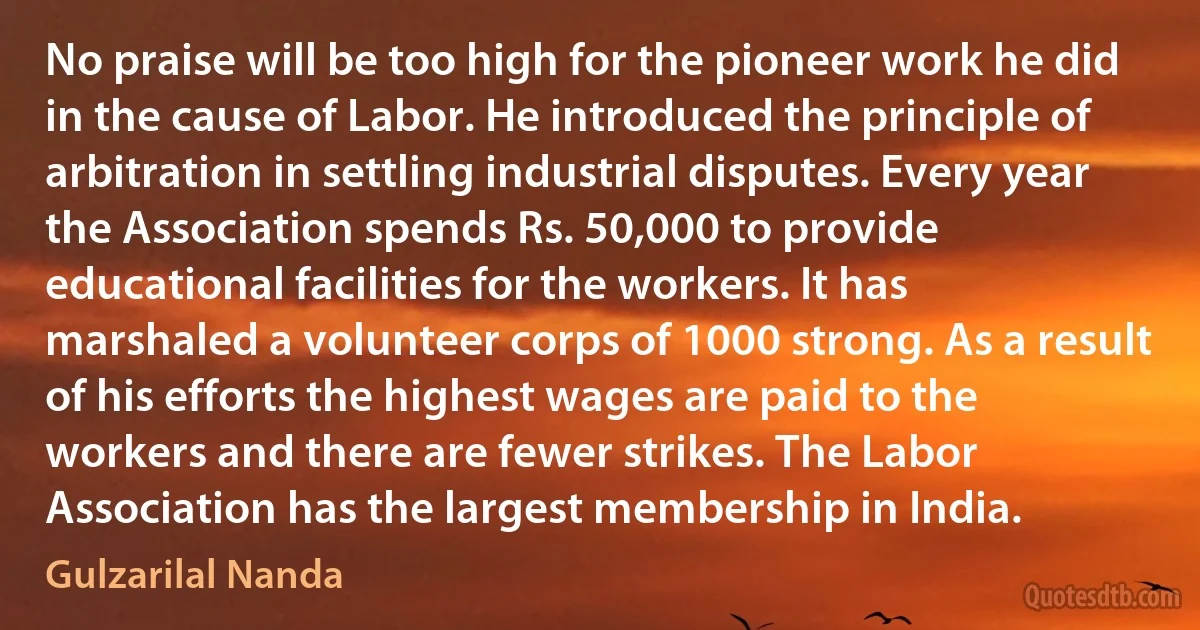Wages Quotes - page 15
In this decade government at all levels has increased spending faster than the true rate of economic growth... The cure for inflation has been administered with a vengeance. Yet most people feel worse, not better, about their government benefactor. The elderly find their fixed income eroding in half; those about to retire fear their future pensions will never keep pace. Ten million California workers see their wages rise but not as fast as prices. Those on welfare obtain larger grants but find more expensive groceries.

Jerry Brown
He was a free-trader, because he felt it was the best, with all its drawbacks. There were higher wages in protected America, but there was corrupt politics. Protection in America meant more sweating in America than free trade did in England. The very worst of conditions and slums in England were a paradise compared with the conditions of steel workers under protection in Pittsburg. The whole of the protection system was meant not for workers, wage-earners, or the wives of working men, but to make capitalists millionaires.

Ramsay MacDonald
[I]n conditions of full employment, such as we have today, it is clear that the bargaining power of Trade Unions is very strong. Employers in general can sell all they can produce profitably and are afraid that they will never get their labour back if they once lose it. Workers know that there is plenty of work available. Thus there is no real obstacle to the steady increase in wages, which in turn leads to corresponding increases in prices. I must tell my colleagues that I do not see any easy answer to this problem.

Rab Butler
Man is the only animal that deals in that atrocity of atrocities, War. He is the only one that gathers his brethren about him and goes forth in cold blood and calm pulse to exterminate his kind. He is the only animal that for sordid wages will march out ... and help to slaughter strangers of his own species who have done him no harm and with whom he has no quarrel ... and in the intervals between campaigns he washes the blood off his hands and works for "the universal brotherhood of man" - with his mouth.

Mike Jones
[B]efore she accepted the offer she had to know if the President-elect would support her in advocating the programs she would wish to pursue as secretary of labor. ...[S]he pulled out a little slip of paper ...the list of goals about which she felt passionate. Among other items on the list were laws for minimum wages and maximum hours, for unemployment insurance and old-age insurance. ...Only when he firmly assured, "I'll back you," could she think about... accepting the offer.
And so... on March 4, 1933 Frances Perkins became the first woman to serve in the United States Cabinet... The legacy of her years in office continues to affect the life of every U.S. citizen.

Frances Perkins
When she and Roosevelt had first discussed the possibility of her appointment, she had given him a list of policies... Most dealt directly with unemployment: public works, minimum wages, maximum hours, unemployment insurance, old age and retirement insurance, abolition of child labor, creation of a federal employment service, federal aid to the states for direct relief and promotion within the states of state labor laws. Immigration was peripheral.

Frances Perkins
The wage-earner is as much entitled as the property-owner to claim equitable consideration for his established expectations...and that workmen have precisely the same right to be satisfied that organization is efficient, and management up to date, as management has that workmen are earning their wages.

R. H. Tawney
It will be impossible to secure preferential treatment with the colonies without some duty on corn as well as on other articles on food, because these are the chief articles of colonial produce. Whether this will raise the cost of living is a matter of opinion, and there is no doubt that in many cases a duty of this kind is paid by the exporter, and it really depends on the extent of competition among the exporting countries... But, even if the price of food is raised, the rate of wages will certainly be raised in greater proportion. This has been the case both in the United States and Germany. In the former country the availabile balance left to the working man after he has paid for necessaries is much larger than here. These are facts which we have to bring to the notice of the working men generally.

Joseph Chamberlain
If employment is falling off, what is the lesson? The lesson is that our home trade, our domestic consumption, must have decreased in a larger proportion than our foreign trade has increased. (Hear, hear.) The competition from abroad has grown more and more severe, and, on the whole, taking our trade as a whole, it must have declined if the employment in trade has decreased. (Hear, hear.) Wages have been reduced. You have only to read the papers to see almost daily some trade or another has to submit to a reduction. That, then, is not a proof of boundless prosperity. It is a proof of comparative decline, and, in my judgment, the handwriting is on the wall, there to be read by every impartial man; and, though I contemplate no immediate catastrophe, I say the situation calls for preparation while there is still time to find a remedy. (Cheers.)

Joseph Chamberlain
Actually, the labor market was allowed to retain its main function only on condition that wages and conditions of work, standards and regulations should be such as would safeguard the human character of the alleged commodity, labor. To argue that social legislation, factory laws, unemployment insurance, and, above all, trade unions have not interfered with the mobility of labor and the flexibility of wages, as is sometimes done, is to imply that those institutions have entirely failed in their purpose, which was exactly that of interfering with the laws of supply and demand in respect to human labor, and removing it from the orbit of the market.

Karl Polanyi
They should remember that if wages were not so good as they should be, if the hours were long, and if the conditions of labour were becoming worse, the responsibility rested with those men who would not come inside the union and try to make things better. What was it that kept them apart? Some people said it was because...men held different religious opinions they would not work together in the union. Nothing, in his opinion, could be more stupid. What did it matter to a man whether his neighbour was a Protestant or a Catholic so long as they were working men and had one common interest, to work together for each other's good?

Keir Hardie
Wages, profits, prices are determined, always have been determined, and always will be determined until we go Communist, by the market-by supply and demand working through the market. While we tie ourselves into knots trying to invent non-market criteria for our commissions to use, the market is there, noiselessly, efficiently, irresistibly doing the job for us all the time. Irresistibly-yes, and there's the rub. For there is one thing outside the market in a modern economy, and that is money itself. Governments can and do satisfy the demand for money, raise and lower the supply of money. In short, governments have the power to control money, which is so largely their own creation. If governments allow monetary demand to increase faster than productivity, the market will not stop the process, because it cannot stop it. The market will simply go on determining wages, profits and prices in ever higher monetary terms-until something busts.

Enoch Powell
Contrary to popular belief there is no reason whatever to suppose that the remuneration of labour in general has been raised by the combination of labour through the trade unions to a higher level than it would have stood at otherwise. The rising standard of living of the employed population is due to many causes; but restrictive practices are not among them. No doubt in individual occupations combination has from time to time succeeded in raising real wages above what they would have been in its absence; but any such gain, which is invariably at the expense of workers in other employments and of the general public, is always temporary and usually brief. After more or less inconvenience and, in recent times, by dint of more or less inflation, the pattern of real wages reverts to one which corresponds with the balance of supply and demand for labour in the various employments in different parts of the country.

Enoch Powell
Enoch was right. He had made the two intellectual leaps in economic policy which Keith Joseph and I would only make some years later. First, he had grasped that it was not the unions which caused inflation by pushing up wages, but rather the Government which did so by increasing the supply of money in the economy. Consequently, incomes policies...were a supreme irrelevance to anti-inflation policy. The only aspect of the matter which Enoch then and later failed sufficiently to grasp was the importance of the indirect link between trade union power and inflation. This lay in the fact that over-powerful trade unions priced their own members out of jobs, and inflicted unemployment on both union and non-union workers alike. Governments...would then react by lowering interest rates and expanding the money supply. This would increase demand and jobs for a time, but it also increased inflation... That said, Enoch's insight into the cause of inflation was of supreme importance.

Enoch Powell
Russia has entered the year 1997 with a heavy burden of problems and the situation in the country is extremely complex, above all as concerns the economy. We have failed to stop the production slump and ensure the influx of investments. Society's belief in the ability of the power structures to stop the onslaught of crime is being undermined. It is ever more difficult to provide the armed forces with the essentials. The already low standard of living for the majority of Russian citizens continues to decline. People are suffering from delays in the payment of wages, pensions and benefits. All efforts to solve this problem have failed to yield tangible results.

Boris Yeltsin
China is operating in Congo in a brutal way that smacks of slavery. Congolese work in mines for very low wages. China is not concerned with sustainability and often commits a predatory economy. The country also does not respect human rights. Still, the developing country's government is letting itself be wrapped up, because the Chinese don't make moral demands like the West does. China works with a closed stock exchange in Congo. For example, they build 20 schools in exchange for being able to operate 10 copper mines for 1 year. But that is often peasant deception: the value of the school buildings is sometimes only 10% of the value of the extracted raw materials.

Mark Eyskens
Within the next year they are spending millions of dollars to destroy the United Farm Workers. They are spending millions of dollars to tell what a bad administrator César Chávez is. Have you seen these articles in the New York Times and Time magazine? They say César Chávez is a bad administrator. What they really mean is he is the wrong color. And if he were a good administrator.... Can you imagine five clinics, a medical plan, a credit union, a retirement center for farm workers, fantastic increases in wages, the removal of the labor contract system-all of this César did in a few short years. What would he do if he was a good administrator?

Cesar Chavez
What right-wing people in this country would love is an open-border policy. Bring in all kinds of people, work for $2 or $3 an hour, that would be great for them. I don't believe in that. I think we have to raise wages in this country, I think we have to do everything we can to create millions of jobs.
You know what youth unemployment is in the United States of America today? If you're a white high school graduate, it's 33 percent, Hispanic 36 percent, African American 51 percent. You think we should open the borders and bring in a lot of low-wage workers, or do you think maybe we should try to get jobs for those kids?
I think from a moral responsibility we've got to work with the rest of the industrialized world to address the problems of international poverty, but you don't do that by making people in this country even poorer.

Bernie Sanders
The growers are willing to spend tremendous amounts of money to try to represent the fact that farmworkers don't want a union, by hiring people like Jose Mendoza, who took a picture with Senator Dirksen to try to prove that the farmworkers don't want a union. They could very easily have paid the workers decent wages with the money they are spending. They have hired public relations firms to try to prove that we are a violent union, which I think everyone knows we are not.

Dolores Huerta
Malthus's population principle was quite as much a banner, and a point of union among us, as any opinion specially belonging to Bentham. This great doctrine, originally brought forward as an argument against the indefinite improvability of human affairs, we took up with ardent zeal in the contrary sense, as indicating the sole means of realizing that improvability by securing full employment at high wages to the whole labouring population through a voluntary restriction of the increase of their numbers.

John Stuart Mill



